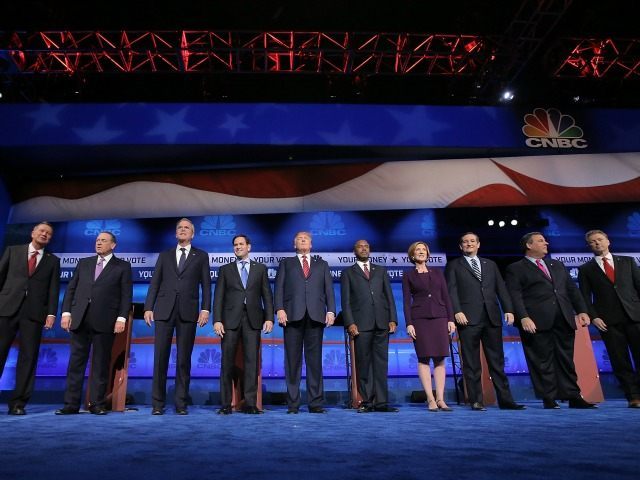GOP attorney Ben Ginsberg prepared a draft letter listing proposed rules for future debates, in the wake of the CNBC fiasco, and sent it to the active Republican campaigns for approval.
As the contents of the Ginsberg memorandum have become known, it has attracted some derision for the large number of proposed rules, many of which have little to do with the problem of biased debate moderation exposed by CNBC’s antics.
Defenders of the letter observe that this is a negotiation process, and it is therefore appropriate to open with a “high bid,” knowing that some of the demands would be negotiated away. As Senator Rand Paul (R-KY) put it to Politico, “I think we offer content that attracts 20 million people. It’s very valuable and the media gets rich off of us. I think it should be a negotiation like any other negotiation.”
Also, it should be noted that the Ginsberg letter is a list of proposals, assembled after a meeting between representatives from most of the presidential campaigns. It may have been a public-relations error to circulate this first draft and draw media attention to a lengthy list of demands, before suggestions from the potential signatories for refining it have been considered – thus inviting criticism that the Republican candidates are overplaying their hand, rather than seizing a moment.
Most of the items in the memo are phrased as questions for the media organization sponsoring the debate to answer. Some of these are obvious and straightforward, such as “Where and when will the debate be held?,” “What is the estimated audience for the debate?”, “What format do you envision – podiums, table, other?” and so forth. Many of these questions are doubtless already covered by existing debate preparation procedures.
Some of the questions are more penetrating inquiries that might prompt follow-up questions or complaints from the campaigns, such as “What are the criteria for inclusion? If you choose to base this on polls, please detail which polls and why each poll’s methodology and sample size is acceptable to you.”
A couple of the questions are better understood as demands:
“Will there be questions from the audience or social media? How many? How will they be presented to the candidates? Will you acknowledge that you, as the sponsor, take responsibility for all questions asked, even if not asked by your personnel?”
“Will you commit to provide equal time / an equal number of questions of equal quality (substance as opposed to “gotcha” or frivolous) to each candidate?”
“Are you running promo ads before the debate about your moderator(s)?” (This seems pitched as a strong suggestion that networks need to be more up-front about the moderators’ biases and political baggage.)
“Can you pledge that the temperature in the hall be kept below 67 degrees?” (Campaigns often worry about venues designed to make the candidates look bad by sweating, a concern that dates back to the famous Nixon-Kennedy debate of 1960, where radio listeners thought Nixon won, but the TV audience responded negatively to his appearance. In the current cycle, there were some complaints about the climate in the second GOP debate, televised on CNN.)
The list of explicit demands in the Ginsberg draft letter asks media organizations, “Will you commit that you will NOT” do any of the following:
Ask the candidates to raise their hands to answer a question
Ask yes/no questions without time to provide a substantive answer
Have a “lightning round”
Allow candidate-to-candidate questioning
Allow props or pledges by the candidates
Have reaction shots of members of the audience or moderators during debates
Show an empty podium after a break (describe how far away the bathrooms are)
Use behind shots of the candidates showing their notes
Leave microphones on during breaks
Allow members of the audience to wear political messages (shirts, buttons, signs, etc.) Who enforces?
Some of these points reference issues that have come up during the 2016 debates (for example, the proximity of bathrooms) while others seem intended to prevent objectionable behavior in the future.
Notably, some might find it strange to prohibit “candidate-to-candidate questioning” at a debate. Presumably this is meant to prevent candidates from ambushing each other with loaded questions conceived out of thin air, not an injunction against them talking to each other.
Several campaigns soon announced they would reject the proposals in the letter, including Donald Trump, whose campaign said it would continue negotiating directly with the networks to establish ground rules for each debate. The campaigns of Carly Fiorina, Chris Christie, and John Kasich also declared their would refuse to sign the letter.

COMMENTS
Please let us know if you're having issues with commenting.